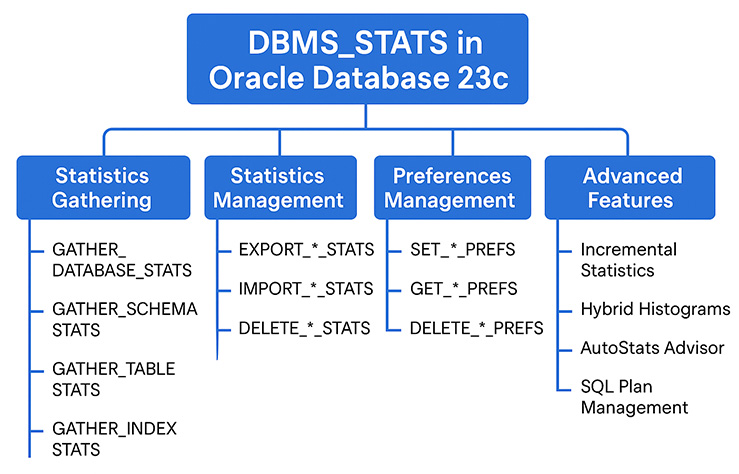| Lesson 5 | What is DBMS_STATS? |
| Objective | Components and uses of DBMS_STATS package. |
DBMS_STATS Package Components
In Oracle Database 23c, the `DBMS_STATS` package is a core component of the cost-based optimizer (CBO) infrastructure. It is used to gather, manage, and manipulate optimizer statistics for database objects. These statistics influence the optimizer's decisions about the most efficient way to execute SQL queries. The `DBMS_STATS` package consists of several components, which can be grouped into functional categories:
- Statistics Gathering Procedures
GATHER_DATABASE_STATSGATHER_SCHEMA_STATSGATHER_TABLE_STATSGATHER_INDEX_STATSGATHER_FIXED_OBJECTS_STATS(for X$ tables and V$ views)GATHER_DICTIONARY_STATS(for dictionary tables)- Parameters for fine-tuning:
CASCADEESTIMATE_PERCENTMETHOD_OPTDEGREE
- Statistics Management Procedures
EXPORT_*_STATSIMPORT_*_STATSDELETE_*_STATSRESTORE_*_STATSCREATE_STAT_TABLE/DROP_STAT_TABLE– for storing exported stats
- Preferences Management
SET_*_PREFS– e.g.,SET_TABLE_PREFS,SET_SCHEMA_PREFSGET_*_PREFS– retrieve current preference settingsDELETE_*_PREFS– remove preferences- Preferences include:
STALE_PERCENTESTIMATE_PERCENTINCREMENTALGRANULARITY
-
Incremental Statistics and Hybrid Histograms
INCREMENTALstatistics- Hybrid histograms and Top-N frequency histograms
- Use of synopsis data (for partitioned tables)
APPROXIMATE_NDVfor cardinality estimation
GATHER_SYSTEM_STATS– collects stats about the system I/O and CPU performanceSET_SYSTEM_STATS,DELETE_SYSTEM_STATSGET_SYSTEM_STATS– fetch current system-level stats
REPORT_STATS_OPERATIONS– shows stats jobs historySHOW_*_STATS– to review object statisticsDIFF_TABLE_STATS_*– compare two sets of statsVALIDATE_STATS– verify the presence and quality of statistics
- AutoStats Advisor integration
- SQL Plan Management (SPM) tie-in
- Hybrid partitioning-aware gathering
- Extended statistics (multi-column, expressions)
- Better handling of in-memory statistics
- Via AutoTask framework
- Configured using
DBA_AUTOTASK_*views - Controlled using
ENABLE,DISABLE,SET_GLOBAL_PREFS

Cost-based Optimizer and Statistical Information
The decisions of the cost-based optimizer are all based on statistical information about the composition of the tables and indexes used by a query. In previous releases of the Oracle database, the
Expert Oracle Indexing and Access Paths
ANALYZE command was used to collect statistics. In Oracle, the ANALYZE command has been replaced by a package[1] of PL/SQL procedures called DBMS_STATS.
- How is DBMS_STATS different?
There are two basic ways that the procedures in the
DBMS_STATSpackage differ from the options offered by theANALYZEcommand:- Internally, the procedures in the
DBMS_STATSpackage are run with parallelism[2], whereas theANALYZEcommand does not take advantage of the parallel capabilities of Oracle. - Functionally, the
DBMS_STATScommand allows you to gather statistics and store them outside of the data dictionary's capability that is explored in more detail in the next module.
- Internally, the procedures in the
Components of the DBMS_STATS package
There are a number of procedures in the
In the next lesson, you will learn how to use statistics stored outside of the data dictionary.
DBMS_STATS, as detailed in the following table. The table lists the overall purpose of a group of procedures, the procedures used for that purpose, and a brief description of the procedure:
| Purpose | Procedures | Description |
| Gather statistics |
GATHER_INDEX_STATSGATHER_TABLE_STATSGATHER_SCHEMA_STATSGATHER_DATABASE_STATSGENERATE_STATS
|
The GATHER_STATS packages collect statistics from tables and indexes. The GENERATE_STATS procedure generates the statistics for an object from a group of related objects. |
| Delete statistics |
DELETE_COLUMN_STATISTICSDELETE_TABLE_STATISTICSDELETE_INDEX_STATISTICSDELETE_SCHEMA_STATISTICSDELETE_DATABASE_STATISTICS
|
Removes any existing statistics from the data dictionary or an external table, if specified. |
| Use external table to store statistics | CREATE_STAT_TABLEDROP_STAT_TABLE |
Creates and drops an external table to store statistics. |
| Export statistics |
EXPORT_COLUMN_STATISTICSEXPORT_TABLE_STATISTICSEXPORT_INDEX_STATISTICSEXPORT_SCHEMA_STATISTICSEXPORT_DATABASE_STATISTICS
|
Exports statistics to an external table from the data dictionary. |
| Import statistics |
IMPORT_COLUMN_STATISTICSIMPORT_TABLE_STATISTICSIMPORT_INDEX_STATISTICSIMPORT_SCHEMA_STATISTICSIMPORT_DATABASE_STATISTICS
|
Imports statistics from an external table to the data dictionary. |
| Convert values |
CONVERT_RAW_VALUEPREPARE_COLUMN_VALUES
|
Converts values to (PREPARE_COLUMN_VALUE) and from (CONVERT_RAW_VALUE), the Oracle internal format for statistics. |
| Set statistics | SET_COLUMN_STATSSET_INDEX_STATSSET_TABLE_STATS |
You can use these procedures to set values for statistics. Use only when you have a complete understanding of how statistics are used by the optimizer. |
| Get statistics | GET_COLUMN_STATSGET_INDEX_STATSGET_TABLE_STATS |
Used to retrieve values from statistics tables. |
In the next lesson, you will learn how to use statistics stored outside of the data dictionary.
DBMS_STATS - Quiz
Click the Quiz link below to test your knowledge of Oracle optimization concepts.
DBMS_STATS - Quiz
DBMS_STATS - Quiz
[1]Package: A group of PL/SQL procedures that are combined into a single logical grouping. The package header contains the interface description for the procedures, whereas the package body contains the actual code for the procedures in the package.
[2]Parallelism:The ability of the Oracle database to divide a single request into multiple tasks that will execute in parallel, which usually results in reduced execution time.